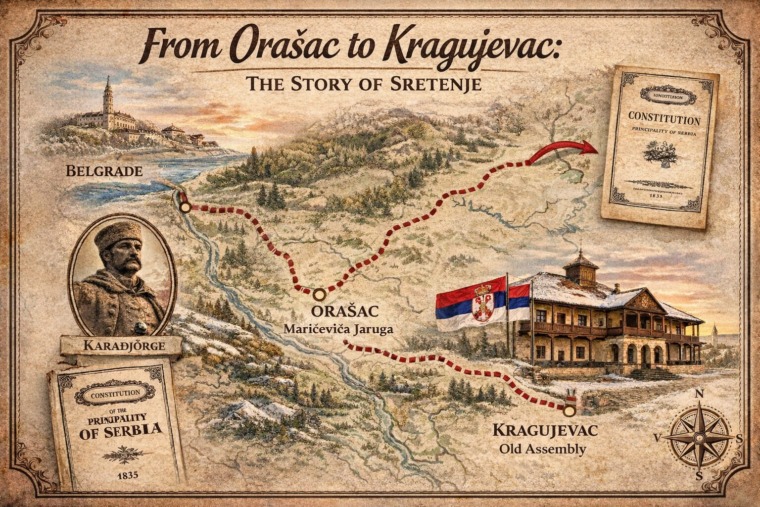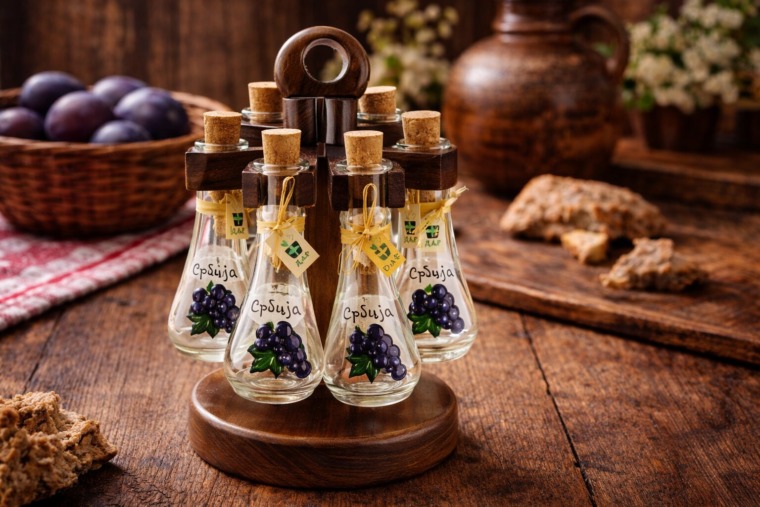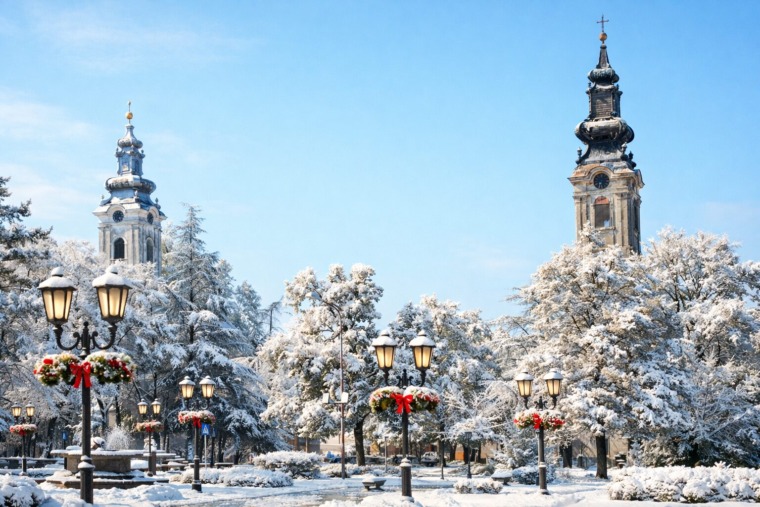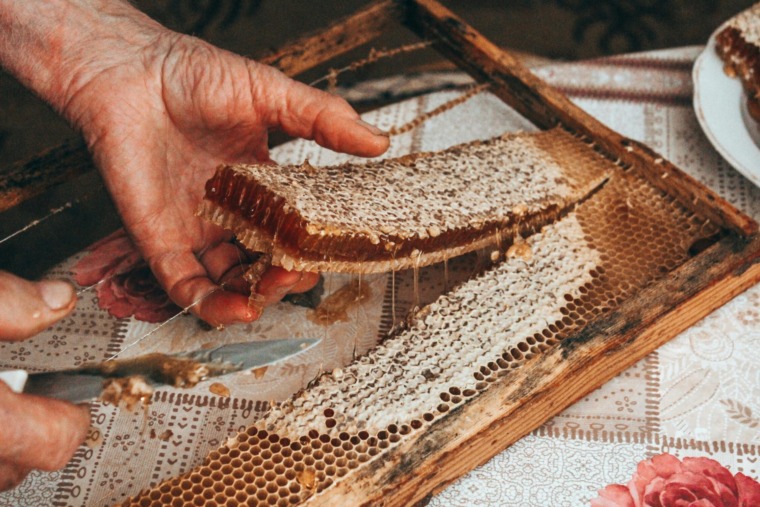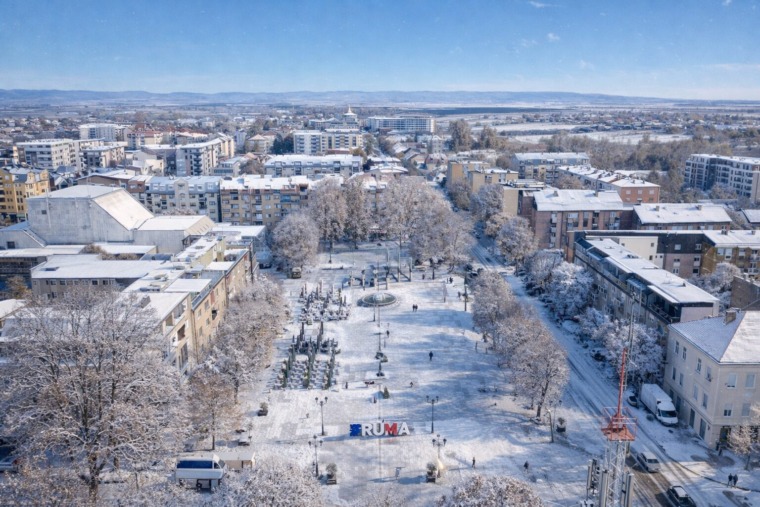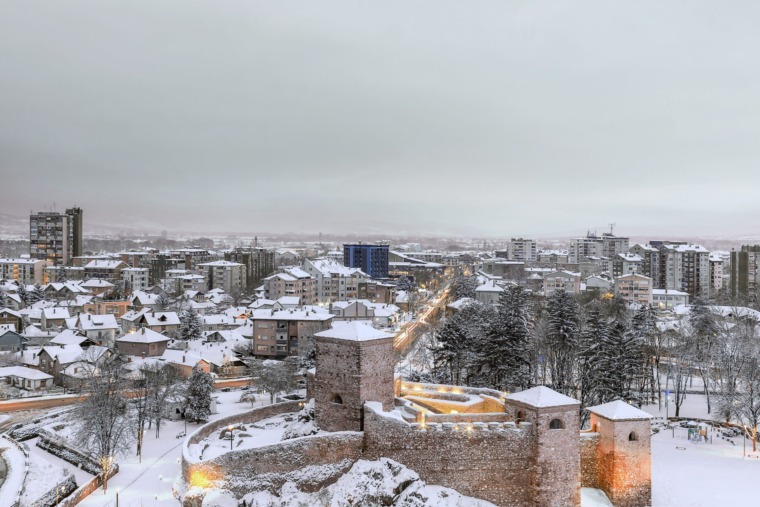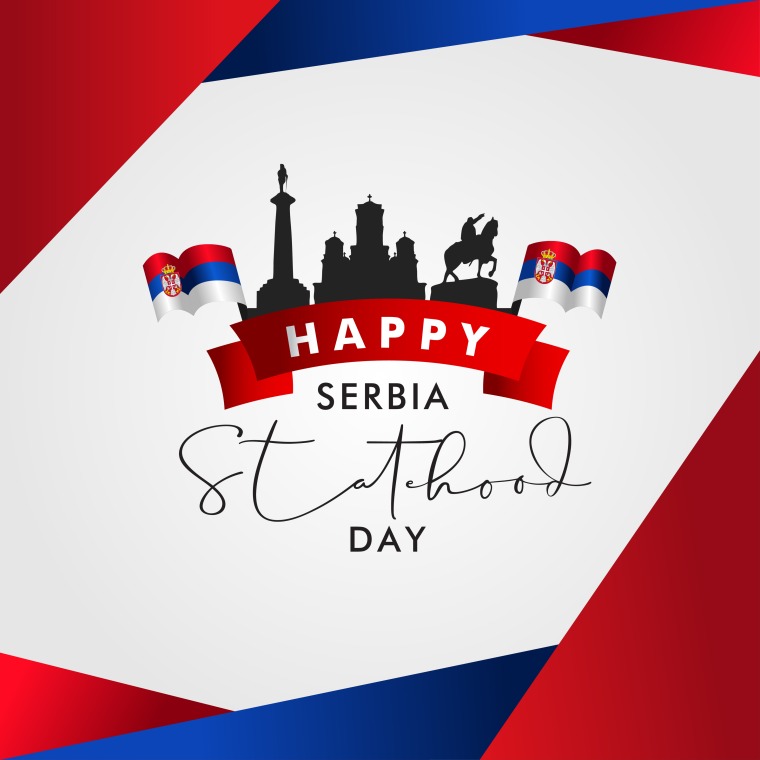
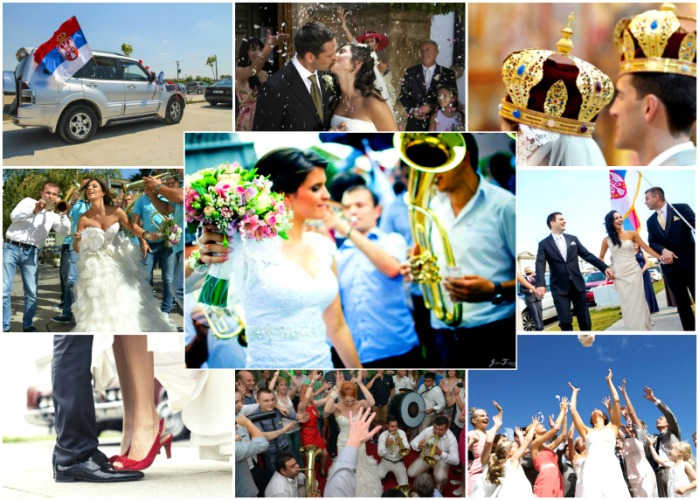
Want to know what in the name of God is a man with hot peppers around his neck and a whip in his hand doing on a Serbian wedding? Interested in why the bride had to wear a clove of garlic in her bosom, and why she and the groom had to “fight” over a piece of johnny-cake or step on each other’s feet? Find out all the wonderfully weird wedding customs in Serbia – right here!
We all know Serbian weddings are loud and messy, but here are some old Serbian wedding traditions you won’t believe existed.. And still exist!
Shoes for the PROVODADŽIJA
Once the matchmaker (in Serbian provodadžija) does his job, arranges the wedding and the soon-to-be newlyweds decide to get married, they have to buy the provodadžija new shoes so that their marriage would be long and spent in happiness.
“Decorating” the BUKLIJA
After arranging the wedding and a few days before starts, it’s time to invite the wedding party (svatovi). In Serbia, according to tradition, the buklijaš, a young man from the groom’s side invites guests by offering them a sip from a special hip flask called buklija. The buklija usually contains rakija and is decorated with flowers or a small towel, and the guests “decorate” it with money.

Hot peppers and a wip – make way, the ŽARAČ is coming!
The žarač, a conspicuosly dressed person wearing a wreath of peppers and holding a whip in his hands has a rather “simple” task – to divert the attention of “evil eyes” from the bride and groom so that they wouldn’t harm them.
The wedding party is led by the…
The barjaktar or stari svat, carries a banner with an apple on top. The wedding party is adorn with towels, flowers and rosemary as are their cars (once horse carriages called čeze and fijakeri).
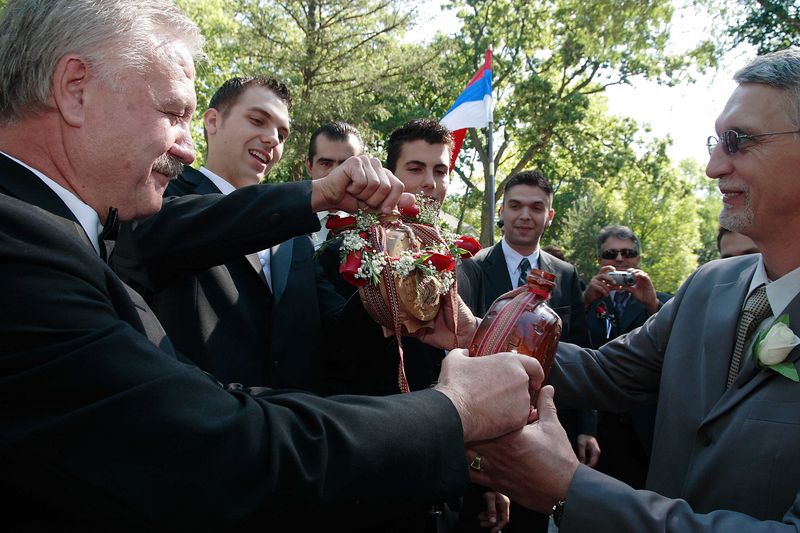
The stari svat, once the groom’s uncle, today the second witness, is a person with contradictory traits but roles as well. He’s the responsible one who organizes the whole thing as well as the one in charge of entertaining everybody. In the past, after the wedding, the stari svat, adorn with a wreath of dry peppers, sat on a carpet and ordered the bride and groom to dance in a kitchen pan.
Something old, something new, something borrowed, something blue
This only one of the rules a traditional Serbian bride has to go by when it comes to her wedding “dress-code”. But, as Serbs are a very imaginative people, this is but one of the customs related to the way a Serbian bride has to be dressed. Most of the customs and beliefs have to do something with repelling evil forces, demons, jinxes, etc. It is said that they are particularly active during these festive days.
Mirror, mirror on the wall, who’s NOT the fairest of them all?!
Serbian brides even used to carry small mirrors so that the demons would get scared by their own reflection.

“There can be only one”
If it ever happened that two wedding parties meet when going from one village to another, the brides had to hide. Why? Because it was believed that the bride that was seen would not only not get married but die.
Garlic in the bosom against bad luck
Another recipe for avoiding being jinxed involved the bride putting a clove of garlic in her bosom during the wedding preparations, dressing, etc.
God forbid you wear pearls!
If the bride doesn’t want to spend her marriage in tears, then she shouldn’t be wearing pearls as they symbolize tears.

The WREATH
The bridal wreath or the nevestinjski venac had a couple of meanings when it came to Serbian weddings. Firstly it made the bride stand out from the rest of the wedding party, secondly it protected her from evil entities. It was made from various materials and it often had peculiar elements such as strands from a horse’s tail, a peacock feather a cross-shaped charm, etc. It also symbolized her wish to be fertile.
The VEIL
Apart from protecting the bride from evil spirits, the role of the veil (veo) is to hide her beauty from other men.

Shooting of the apple
The shooting of the apple is one of the most common Serbian traditions when it comes to wedding customs. It’s still being performed all over Serbia. The father-in-law puts an apple on the highest tree in the bride’s yard and until the groom shoots it the bride can’t leave the house.
Everything’s possible when it comes to the BUYING OF THE BRIDE!
The bride is “sold” by her own brother, and “bought” by the groom or the stari svat. When it comes to Serbian weddings this is perhaps the most interesting wedding custom. Why? Because the groom will often get a “fake bride” – usually a man dressed in a wedding gown posing as his future wife. However, it can also happen that the groom outwits everyone and, by sneaking through the window at the other side of the house, steals the bride.
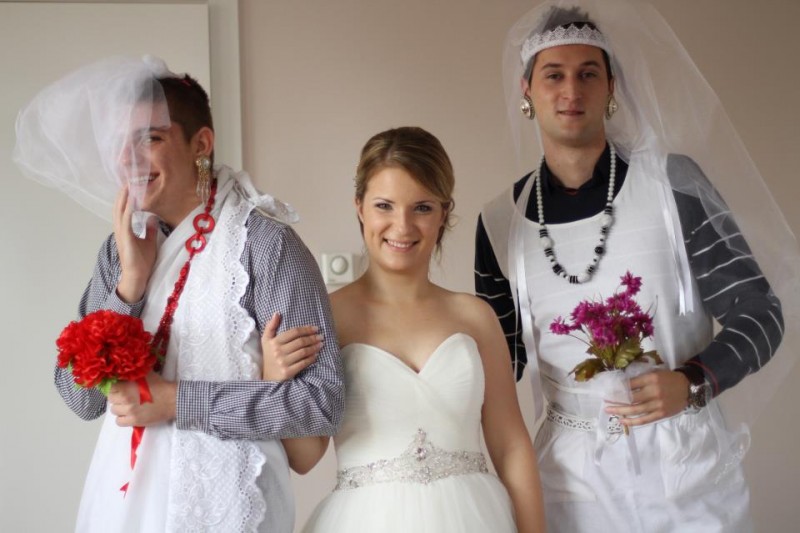
The Serbian Cinderella
Another unusual Serbian wedding custom is that during the “buying of the bride” the groom’s brother puts money in the bride’s shoe and spins in three times.
A boy or a girl – depends on the glass!
Before the wedding ceremony, the bride drinks from a glass, toasts and then throws the glass. If the glass breaks she will have a boy and if it doesn’t she’ll have a girl.
Who’ll run the house?
During the wedding ceremony when the soon-to-be married couple are saying their I do’s, the bride can (and in Serbia usually does) step on the groom’s foot. She does this because it supposedly means she’ll wear the pants in the house.

“You want me to pull your nose?”
After, the couple is married, in Serbia the bride asks all the single girls this question.The general belief was that the one that the bride pulls by the nose will get married next.
The bouquet for men? An apple!
After the church wedding the bride cast over her head an apple in which coins are embedded. Whichever guy catches it gets married next, just like with the bouquet and women.
The throwing of the SITO
Before the bride enters her new home (she usually went to live with her husband and his family), she takes sito, a special mixture of grains, and throws it over the roof of the house. It is said that if it stays on the roof the bride will stay in her new home. This custom is very much alive even nowadays. There is another one which involves the wedding party throwing wheat, rice, barley, etc over the newlyweds which symbolizes fertility, posterity and plenty in the married life.

Another broken glass
This time the bride breaks it in front of the house she’ll live in, so that all the arguments and conflicts would stay much like the glass – in front of the house.
The NAKONČE
Also, before she enters the house, the bride is supposed to lift a little boy traditionally called nakonče, three times, so that she will have male children.
Jumping over the doorstep
There were, and are still, a lot of customs and “rituals” the bride has to do before she enters her new home. One of the oldest ones in the bride’s jumping over or being carried over the doorstep. This is done because it was once believed that deceased family members were buried under the hearth or under the doorstep. In order not to desecrate this place, the bride must not step on it.

A pitcher of water
Another old custom regarding the doorstep is the one where a pitcher of water is put on it. Upon her first entering of the house, the bride is supposed to tip it over with her foot. This almost forgotten old Serbian wedding custom was envisioned to bring good luck to the household.
Sweet like honey!
After she (finally!) enters the house, the bride is offered honey by the mother-in-law so her marriage would be sweet.
Have some bread
This time a young single girl hangs bread on the bride’s shoulders so that she would be obedient.
MATERINA POGAČA
Before the celebratory lunch, the bride’s mother bakes a special johnny-cake called materina pogača (meaning Mother’s johnny-cake). The newlyweds are supposed to split it together and the one who gets the bigger piece will be the “man of the house”.

“The little red dress”
In some parts of Serbia, after midnight the bride puts on a red dress instead of her wedding gown. This symbolizes a loving marriage.
Sending off the best man – chair by chair
To end it off, we give you a really unusual, even a bit funny Serbian wedding custom. When the best man decides to go home, he MUSTN’T touch the ground. He has to walk on chairs, to be more precise – from one chair to another, step by step, without any help. Now visualize that!

